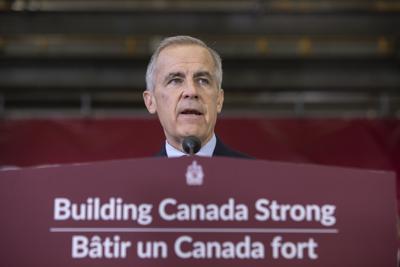OTTAWA ÔÇö Prime Minister Mark Carney says he will strike pharmacare deals covering diabetes and birth control drugs and devices with all provinces and territories, but would not commit to expanding the program into the more comprehensive plan it was initially envisioned to morph into.
At the Liberals’ cabinet retreat in Edmonton on Thursday, Carney pledged to reach agreements with “outstanding provinces ÔÇŽ as quickly and as equitably as possible.”
“It’s going to be a challenging budget in many respects,” the prime minister told reporters, referring to the austerity-meets-investment blueprint he is set to table this fall.┬á
“These are tough times. We have to take some tough decisions. But one of the core reasons why we’re taking tough decisions is for affordability and security for Canadians. So that┬áincludes child care ÔÇŽ that means supporting health care in this country, pharmacare, dental care, things that make a huge difference in peoples’ lives. We have to be in control of federal spending, so we can continue to support those programs.”
That means Carney must ink deals with seven provinces and two territories: the Trudeau government had already struck bespoke agreements with Manitoba, British Columbia and Prince Edward Island, while the Liberals reached a deal with Yukon shortly after Carney was sworn in as prime minister. Ottawa has committed nearly $1 billion to the four existing agreements, to be doled out over four years. 
The prime minister’s comments come after Health Minister Marjorie Michel was asked in July how much of a priority it was for Ottawa to reach a deal with other provinces.┬á
Michel said that Canada now had a “new government” and that the country was in a “new context,” prompting concerns from health-care advocates that the remaining deals ÔÇö including with Ontario, which has signalled its openness to reaching a pact ÔÇö would never come to fruition.┬á
The agreements stem from a pharmacare bill ÔÇö a byproduct of the parliamentary alliance between the Trudeau Liberals and Jagmeet Singh’s NDP ÔÇö that became law nearly a year ago. While the bill sought to cover two classes of drugs through agreements with provinces, it also laid out a framework for a universal, government-paid system that would eventually replace CanadaÔÇÖs jumble of private and public coverage plans.┬á
The legislation resulted in the formation of an expert committee to study the “operation and financing of national, universal, single-payer pharmacare.” Under the law, that group must release its final report a year after the bill’s passage, a deadline that arrives Oct. 10.┬á
Carney, however, said Thursday that expanding the program to cover more classes of drugs is “a different question.”
ÔÇťI’m glad to hear that he’s going to complete agreements with all the provinces and territories,ÔÇŁ said NDP interim leader Don Davies, who worked with the previous Liberal government to craft the legislation.┬á
But Davies told the Star pharmaceuticals should be expanded as an insured service under the Canada Health Act.
ÔÇťSo the two major classes of drugs that we negotiated last Parliament are the first step of having universal access through our public health care system,” Davies said, “and we’ll never stop agitating for expanded pharmacare so everybody can get the medication that they need.ÔÇŁ
Dr. Eric Hoskins, a former Ontario Liberal cabinet minister whose landmark national report in 2019 pushed for a universal single-payer pharmacare system, said Ottawa has been dealing with a spate of new priorities since the beginning of the year, and that he understands why Carney is taking an “incremental” approach.
“It’s so important to have this clarity,” said Hoskins, who also played an instrumental role in getting the Liberals and NDP through fraught negotiations on shaping the legislation.
“I think the last thing anyone would have wanted is to create an even more patchwork program of diabetic medications and contraception, where you’ve got a handful of provinces and territories that have it, and others that don’t.”
Steven Staples, the national director of policy for the Canadian Health Coalition, said he was “confident” that once the early results of a pharmacare program become more clear, there will be “a lot of interest” in expanding the list of covered medications to other classes of drugs.┬á
He attributed Carney’s decision to fully commit to deals with all provinces and territories, in part, to recent pressure from advocacy groups for the Liberals to make health care a priority policy area.┬á
The Canadian Health Coalition and other groups held a rally outside the Edmonton hotel where Carney was hosting caucus members this week, met MPs at Edmonton’s airport, and posted a trio of billboards welcoming the Liberal caucus to the city and urging MPs to “keep your pharmacare promise.”
With files from Tonda MacCharles
Error! Sorry, there was an error processing your request.
There was a problem with the recaptcha. Please try again.
You may unsubscribe at any time. By signing up, you agree to our and . This site is protected by reCAPTCHA and the Google and apply.
Want more of the latest from us? Sign up for more at our newsletter page.


























To join the conversation set a first and last name in your user profile.
Sign in or register for free to join the Conversation